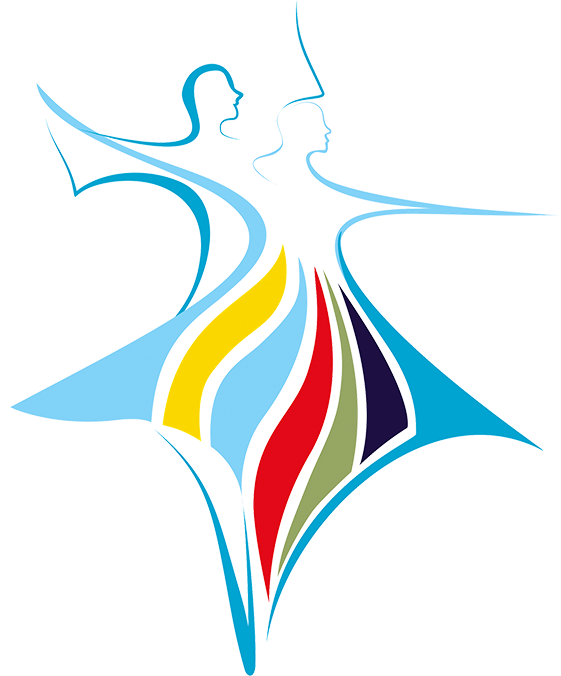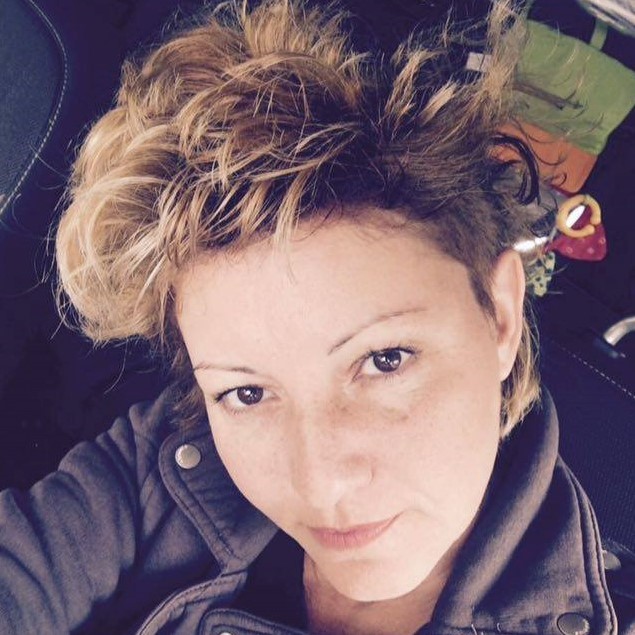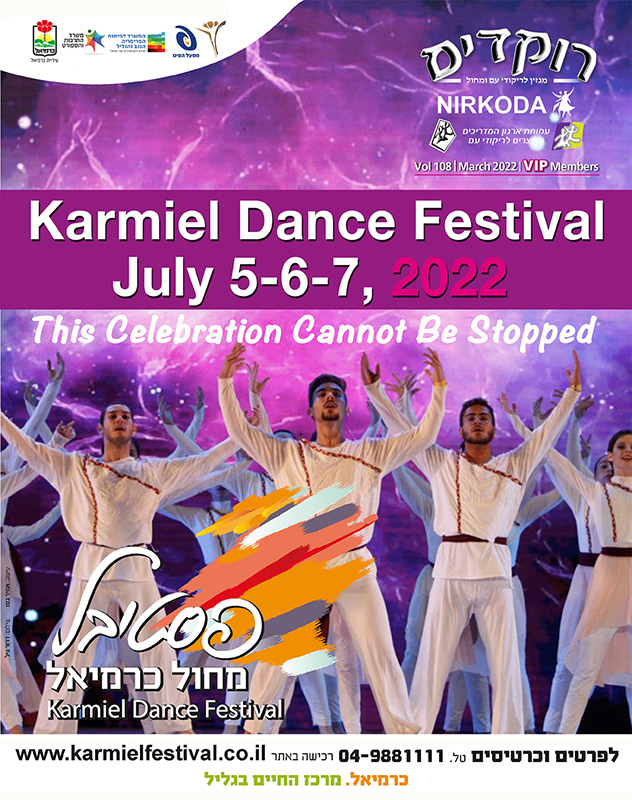- Home
- Rokdim Nirkoda 108
- A Teacher For Life
A Teacher For Life
Interview with Liora Slutzky – Dancer, Instructor, Broadcaster, Skipper and… Friend
- Translation: Dena Matmon
“My mother used to stand in the doorway of the room in the “Omna” orphanage where I was staying, look at me and cry. My mother could neither enter the room, get near me, nor pick me up into her arms and hug me. She wasn’t able to smell the scent of my small and lean body. She didn’t touch her lips to my cheek and she didn’t kiss me. And I was only a one- year-old infant, but she never held me…. because she had tuberculosis…”
This is how Liora Slutzky, the daughter of Tulichka and Ya’acov Uri Licht, began her life in Israel. Liora was born in May 1950. Her father, Ya’acov Uri, immigrated to Israel in 1936 and settled in Neve Sha’anan [a neighborhood in eastern] Haifa, together with his grandmother, Bubicha, and his uncles. They were among the founders of the Neve Sha’anan neighborhood.
Just before the outbreak of World War II, his grandmother implored and told him: “Go to Poland and take Tulichka, your cousin, as your wife. I want you to have a fictitious marriage with her, so that she can also immigrate to Israel. War is at our door and you must hurry.” And so it was. My father married my mother, and they immigrated together to Israel.
To their good fortune, they managed to escape Poland moments before World War II broke out. When they boarded the ship and were still on deck, they heard the sound of artillery shells fired by the Germans who came to conquer Poland. Since this was a fictitious marriage, my father went out with other women; as yet, there wasn’t any emotional commitment between my parents. However, in time, they fell in love. Mother became pregnant in 1949 and carried me, but then she became ill with tuberculosis.
The pregnancy was difficult and there were always stories that Mother almost died during the delivery. But I only learned that she had had this terrible disease when I was 30 years old. The Poles don’t talk a lot; they give out very little information.
There was an orphanage called “Omna” on Hanita Street in Neve Sha’anan. I was taken straight from the hospital to the orphanage because my mother couldn’t take care of me and my father had to work.
I stayed at “Omna” for about a year. The girl who took care of me was Nira. My mother wasn’t allowed to get near me because of her continuing illness and the only one who came into my room was my father, and sometimes some distant relatives. On one such visit, my uncles came as well as my great-grandmother, the one who arranged the marriage between my parents. Mother’s cousin got to know Nira, my caregiver, and they became close. They fell in love and married and dear Nira became part of the family. Even today I still call her “Ima Nira – Mama Nira”. She was my first mother, the one who gave me warmth and love until I was a year old.
Mother
My mother had a colder personality. My father gave me all the warmth. Only now do I understand that the “coldness” that I felt from her was because she suspected that I would catch tuberculosis from her. So, even if she was the warmest kind of person, she wasn’t able to give me the warmth that I so needed.
Mother was traumatized. Try to imagine how a mother delivers a child and the child is immediately taken from her – she couldn’t come near her child until she was healthy again…
When Mother recovered, she was left with emotional scars. She wouldn’t even go for a chest x-ray, even though this was part of her follow-up treatment. The experience of the illness was very difficult for her. They told me that she would peek at me through a small slot in the door of my room and cry bitter tears. She was allowed to visit, but not to come near me, to touch me. And all these years I didn’t know it. Now, in my later years, I understand the significance of all the obstacles.
When I grew up and Mother would talk to me about this and tell me about what happened, I grew angry at her. Angry because I wasn’t told. And now, when I make an accounting of my life – I apologize to my mother. But, she is no longer alive.
Father
My father was a very special person. He was infinitely and unendingly a giving person. He always worried about the entire family. At first, he worked in a quarry, then he was recruited to the Brigade and served in the British Army. Then in the 50’s and even a little after, he went into a partnership in a ticket selling office in Haifa.
Father worked in the ticket office with his very good friend, Avraham Bogtir. They began to work as impresarios. At a certain point, they decided to bring Cirque Medrano to Israel (from Paris). Afterwards, they brought “Paris on Ice”. The business grew and in order to develop it even further, they decided to open an office in Tel Aviv. So, we moved from Neve Sha’anan to Jabotinsky Street in Tel Aviv.
My father and his partner had their office on the Hod Passage on Dizengoff Street. They continued to bring many artists from abroad. My father flew to Russia, received a balalaika as a gift and succeeded in bringing Mstislav Rostropovich the famous Russian cellist and conductor, to Israel. Later, he also brought Jacques Brel, Sammy Davis Jr., Miriam Makeba, The [Russian] Ballet On Ice, and others.
My father was a loving, embracing person. He taught me to swim, to ride a bicycle, and to drive when I was 10 years old in Neve Sha’anan. He himself gave me driving lessons. He was the light of my life. And everyone who every worked with him – loved him very much.
My father was an honest and humble person. He succeeded under his own power and the family considered him to be well-off. He always helped the family financially. He was full of life. Wherever my father went – I went with him.
He gave me everything, even if I didn’t ask for it. I was a good girl, a little mischievous, a little wild – but not a lot – and very shy. What was most noticeable was my sensitivity and lack of self-confidence. People thought I was a snob, but I was really just shy.
Internally, as a person, at times, I still feel a lack of confidence. I don’t always believe that I did the very best. I’m a natural perfectionist. And it’s not easy to be an only child. I always wanted siblings. So instead, I adopted dogs, but my mother didn’t want them. I was missing someone to be at home with me. Now, in my later years, I’m more aware. The Poles don’t talk too much.
Since I’m an only child, I asked my parents to bring me a brother or a sister. My parents told me that I wasn’t missing anything, and I always got what I wanted. But from my point of view, that didn’t matter. Generally, Polish people don’t give many explanations and thus, they didn’t speak of the Holocaust. My generation grew up without this knowledge and we had no idea what had happened. My mother decided that she is “erasing” the Polish language and I was spoken to at home either in Hebrew or in Yiddish. Fifteen years later, after the Eichmann Trial, they decided to talk about everything they had internalized.
Folk Dancing
During that period, there was a great deal of folk dancing in northern Israel. It came from the kibbutzim in the north and spread out. And of course, Neve Sha’anan became part of this process. From the mid-1950s, Shalom Hermon together with Yonatan Gabay, produced and created the Haifa Dance Parade, every Yom Ha’Atzmaut – Independence Day. It was “the thing”. An enormous event. And when it all started, I was still a little girl, maybe six years old.
My father knew both of them from our days in Haifa. Later on, my father produced this parade for years. Yonatan was the artistic director and it was done in cooperation with the Haifa Municipality and Shmulik Bialik, who had been the Director of the Haifa Municipality Cultural Department.
I started folk dancing in elementary school in Neve Sha’anan in Haifa. There were ceremonies on Shavuot and we happily danced in the streets. There was a holiday atmosphere. Then, we were drafted into the army. I served in the main medical unit. But at some point, when I was about 20 years old, I moved with the family to Tel Aviv and because of this move, I suffered a tremendous crisis. I didn’t know anyone. Tel Aviv was a foreign city.
After the Army, I decided to study Physical Education at the Wingate Institute and after that, I returned to dancing. At Wingate, I met Nina Orad. At the beginning, Nina taught young children. After several years, she left the field and focussed on folk dancing and to “gush” dancing. It was there that I got pulled in and returned to dancing.
I danced with Yoav Ashriel and Talia Hirsch and in general, I danced a lot. Until one day when I decided to retrain and study the field [of folk dance]. I studied at Nina Orad’s Ulpan for Folk Dance Instructors. All over the country, courses for instructors ran for two years, but at Wingate, it was a one-year course, because those who studied there had already learned instructional methodology.
After I completed the course, I met with Nina. I called her “Ninochka”….and she told me that I could join the team of instructors the following year. I didn’t like this idea and told her that I didn’t feel ready and that I couldn’t do it. Once again, my lack of self-confidence. But Nina didn’t give up and I joined.
Generally, I didn’t dance in the center of the circle; it was only when I was asked to do so. I learned to disguise my lack of confidence, but to this day, I occasionally still find myself feeling that I do not belong.
My father was very famous and full of confidence, but I was never connected to the world of fame. I was even embarrassed to say that I was his daughter, and only because he was so well known. Perhaps because of this trait, I prefer to dance in groups with relatively few dancers and not in groups with hundreds and thousands of people. But when I do open up, it’s another story…..
When I first started to instruct, I was trembling. I started to speak, and I stuttered. I stopped and said to my students: “Wait a minute…. I want you to understand one thing: I’m very shy and I ask you to be forgiving”. So, when I started to teach, the ice was broken, and everything worked out well.
I can confess that I was a strict instructor, demanding and yelling when necessary. I learned a lot from Ninochka until, to my sorrow, she passed away.
I am a teacher. I am not a dance leader. She taught me slowly and introduced me to the world of management, almost without my realizing it. I was with her all the time. I brought her to Wingate and back again. She was like my second mother. Nina was short in stature, about 1.5 meters [under 5 feet], but she was distinguished and noble, my teacher for life, full of energy and with a heart of gold. Outwardly she was harsh, but inside she was soft as butter.
Later, I opened a folk dance chug (session) in Tzahala and additional chugim in Tel Aviv, but I always concentrated more on instruction at the Ulpan. I felt most comfortable there. I taught well and clearly, and it was important to me that my students properly learned the steps I demonstrated.
When Nina Orad knew that she was dying, she told me: “You will now run the Ulpan instead of me.” And indeed, that is what happened. I changed the staff slightly. I recruited Nitzhi Polate, Sefi Aviv and Sefi Bar Lev. I wanted to refresh the team. The examiners were Tirza Hodes, Rina Meir, Tamar Alyagor and Shalom Hermon. There were also guest choreographers like Rivka Sturman and Shalom Hermon. I am fortunate to have known that generation.
Then Ruth Pardes from Givat Washington turned to me and asked me to replace her. I worked there at the same time that I worked at Wingate, which was my home. At a certain point, the Wingate Institute opened an extension at Weisgal in Rehovot and they let me open an Ulpan there and to be responsible for it. I would go there and make sure things were running well. My main purpose was to turn out good instructors, with strong roots, who would grow and become excellent folk dance instructors. I taught many instructors, among them: Hila Emauel, Oren Bachar, Gadi Bitton, Dede Lusky, Oren Ashkenazi, Asher Oshri, Smadar Assor, Yaron Ben Simhon, Yaron Malihi, Eitan Mizrahi, Eitan Tabib, Elad Perel, Nurit Melamed, Ran Hirsch, Revital Golan and many other good people.
Around the year 2000, Gadi Biton told me that he wanted to open an Ulpan at Tel Aviv University and asked If I was willing to come and establish the Ulpan for him. I thought about it. I consulted with several people and was finally convinced when I realized that, recently, there were fewer and fewer students at the Wingate Ulpan. I wanted to continue to contribute to this field and do whatever I could for folk dancing as well as for my own soul; I agreed to his proposal.
Interadio
In 2005, Dorit Malul Mizrahi and her sister opened an internet radio station, and I would listen to it. Then one day, Dorit asked me if I would like to broadcast on the station. I agreed to her request. In time, other broadcasters were added to the list: Yom Tov Ochayon, Ayelet Bukai and others. This was a fun period. But after a period of time, the station closed and in about 2006/7, I decided to reopen it. I called the station “Interadio”.
Danny Mizrahi (z”l) joined me. He loved the old nostalgic dances. I also asked Nurit Melamed to come and broadcast. At the beginning, Danny and Nurit broadcasted. We were a good team. Danny helped me a lot. After a while he introduced his partner, Osnat Edry, and she also joined us, along with Ayelet Bukai and Ola Levkovitz.
I kept the radio station going until six years ago. I also opened a Facebook group with Morgane Greidy who was in charge of public relations. On one of the days she was there, we all travelled north to the instructor, Chaya Shifman (z”l) and we broadcasted from her dance chug. Moshiko Halevy also broadcasted on our radio station. Sometimes I would organize a staff meeting just so that we could all meet together…… At the end of 2015, I decided to stop the radio broadcasts, as I was scheduled to be on my yacht for three months a year and couldn’t do both things at the same time.
And What about Dancing Today?
Today, I don’t dance anymore. But when I started to broadcast again during Covid, the radio filled this void. My soul is attached to folk dancing, it always will be, and it will be with me until the day I die. It was very difficult for me to stop dancing. I remember that I used to come to the nostalgia group just to meet people. So, at the beginning of the Covid outbreak, I started to broadcast again. I worked day and night to prepare the radio show. The broadcasts on the radio station saved my life. I suddenly became acquainted with lots of people through the live broadcast chats on Facebook, people I’d never met before. Listeners from all over the world told me that they watched the many dance videos that I’ve recorded over the years on the “Rokdim” website. This really touched me.
The Boat
I love the sea, despite the fact that in my childhood, I was traumatized by an incident at sea. When I was six years old, my parents registered me for a summer day camp in Gedera, a camp that belonged to a good friend of my father. At that, time swimming was taught in the day camp by throwing the kids into the water before we knew how to swim. The day I was thrown in, I swallowed a lot of water. I became very sick with a high fever and the camp decided to send me home. This was a very traumatic experience for me.
But my father didn’t give up. Despite my fear because of what had happened previously, he took me to the sea and taught me to swim using a different method. He was very clever. Later in life, I studied in a course to become a skipper [captain of a ship or boat]. We had friends who had access to a yacht. We sailed and I loved it very much. My dream was that I would have a yacht of my own that I could sail by myself.
One day, these same friends wanted to sell the yacht and came to me. I bought it and started to sail. I completely fell in love with it. I fell in love with going from place to place. I always searched to reach small islands surrounded by the enormous sea.
Sometimes, while sailing, unpleasant things happened. There were terrifying storms and waters that weren’t calm. But my husband and I didn’t give in and we sailed every summer. We set out to sail and then we would return home. At a certain point, when my husband Eitan retired, we sailed for a longer period, several months. We would come home just to see the grandchildren, the family.
What Draws You to the Sea? To Sailing?
On the boat, I cut myself off. Generally, I’m very temperamental and pressured all the time. I take everything to heart. The boat actually gives me the peace and quiet that I need. I feel connected to my inner self. I reach a state of nirvana. I put on my earphones to listen to local music that I love, lie back in the cockpit or on the deck …. and fall asleep. When I wake up in the morning, and while watching the sea and the sky, I do body stretches. The moment I love the most and wait for, is the moment that I’m on the boat, watching the sky and at the end of the day, finding a small island named Larus, in Greece. When I reach this island, I rent a bicycle and ride. The people on this island are wonderful and I really appreciate experiencing them. There’s a special store there with cakes and ice cream. I order a cup of parfait and forget all my problems.
On a Personal Note:
I first met Liora through the instructional videos on the “Rokdim” website, the tall and slender woman in a skirt and leg warmers on her ankles. And in all of the instruction, she seemed as light as a feather, flowing from the air and coming down slowly, and landing lightly next to the known vase of flowers in the center of the circle that was being filmed. The tight and exact look of Liora is evidence of her exacting and clear instruction; always sticking closely to the steps of the original dance as choreographed, giving the feeling that here is an excellent instructor from whom we can learn so much.
And then I met Liora for this interview. She opened the door of her home to me as well as her heart. She permitted me to immediately see how big a heart she had and how exposed and open she is to the world. She was very frank telling me about what she and her family had experienced since she was a little girl. The story of Liora’s life left me with an enormous impression of good Jews who immigrated to Israel and experienced personal hardships along with the financial successes of her father.
Thank you, dear Liora, for letting me into your world.









Comments
התראות